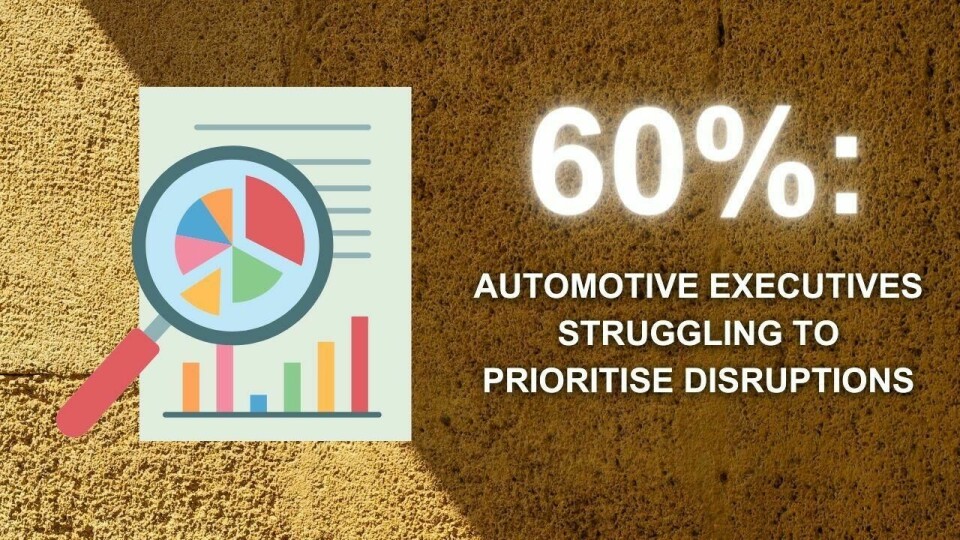AlixPartners reveals 60% of automotive executives are struggling to prioritise disruptions in the shift towards EVs and software
Automotive production facing significant disruptions from EVs and software shift, global consulting firm AlixPartners’ 2024 Disruption Index (ADI) reveals.

Senior automotive executives are grappling with unprecedented levels of disruption, surpassing challenges observed in several other industries. The AlixPartners 2024 Disruption Index (ADI) has revealed a significant sense of upheaval among automotive leaders as they work to navigate and prioritise a multitude of disruptions facing the industry, with problematic implications for automotive manufacturing.
Conducted for the fifth consecutive year, the ADI has gathered insights from 300 CEOs and senior executives from various automotive domains worldwide, alongside thousands more from 10 diverse industries.
Despite a modest uptick in the overall 2024 Index score for the automotive sector compared to the previous year—a score of 72 on a 0-100 scale—automotive executives find themselves facing more disruption than counterparts in the aerospace, consumer products, media and financial sectors.
This year’s ADI has revealed a palpable sense of anticipation among automotive executives, with a significant proportion expecting challenging disruption in the near future. According to the survey, 60 percent of automotive executives across various sub-sectors find it increasingly challenging to discern which disruptive forces warrant priority. Moreover, concerns persist regarding the adaptability of companies, with nearly a third expressing apprehension about their organisations’ pace of adaptation.
Production costs of Software Defined Vehicles (SDV) a cause for concern
While software-defined vehicles (SDVs) present promising opportunities, they also pose significant challenges, particularly in terms of cost and implementation. The survey indicates that a substantial majority of respondents struggle to achieve a satisfactory return on investment (ROI) from SDVs, with 86 percent reporting a meagre ROI of 10 percent or less. Looming events such as the upcoming US presidential election evoke apprehension among automotive executives worldwide.
The survey reveals divergent concerns across regions, with European executives primarily worried about heightened tensions with China, while their North American counterparts prioritise concerns such as economic recession and climate-related policies.
The EV shift and labour shortages are impacting automotive production
Job security remains a prevalent concern among automotive executives, albeit showing slight improvement from previous years. A quarter of respondents express anxiety about potential job loss, with notable discrepancies across regions.
Mark Wakefield, global co-leader of AlixPartners’ automotive and industrial practice, shed light on the importance of decisive action within the disruptive landscape: “From the massive technical and development process changes coming with software-defined vehicles to the recent uncertainty regarding electric-vehicle sales growth, companies need to understand the shifting environment and act decisively. And there’s reason to be optimistic. In fact, perhaps the most interesting change in the automotive results in this year’s ADI is the shift to controllable challenges rather than macro concerns.”
Regional differences and the pressing need for adaptability
The regional differences in disruptive concerns underscore the complexity of the automotive industry, with executives in different regions exhibiting varying levels of awareness and preparedness. While European and Asian executives display optimism towards disruptive technologies like SDVs and autonomous vehicles, their North American counterparts appear more cautious.
Stephen Tapley, a partner at AlixPartners’ automotive and industrial practice, advocates for a balanced approach that combines prudent cost management and investment in future growth initiatives: “The results of this year’s ADI underscore the need for action in a highly complex and truly global automotive industry. In the near-term, executives must be vigilant in their approach to cost control, cash management and digitisation.
At the same time, though, being prepared for the future requires investment in smart growth initiatives, operational superiority, a transformed workforce and the pursuit of new business models.”
Shreyas Sirsi, a director in AlixPartners’ automotive and industrial practice, highlights the critical role of regional and sectoral perspectives in shaping strategic responses to disruption, saying: “Our survey finds that disruptive concerns vary greatly by region and where one plays within the automotive value chain. For instance, executives in Europe and China saw software-defined vehicles and artificial intelligence and automation as bigger disruptive opportunities, versus threats, than did executives in the US.
“These types of variances could mean that some regions and some segments in the automotive value chain are very self-aware, or it could mean just the opposite: that they are either unaware of where they actually stand or that they are missing out on opportunities. Either way, that’s not a good position to be in.”
